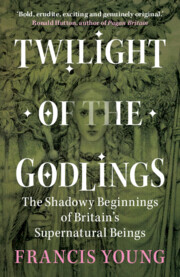‘As Francis Young acknowledges, folklore studies have moved away from the question of origins because of problematic past approaches. His new book boldly returns us to this question by reminding us of an important fact: that folklore is history and can (and should) be studied from a historical perspective, drawing on literary and material evidence to trace the development of folkloric figures. Because of its novel approach, the book will certainly appeal to historians and folklorists alike, bridging the divide between the two – and, with any luck, convincing each of the benefit of the other's viewpoint. Because of its accessibility, the book will also attract the general reader interested in folklore and history. Twilight of the Godlings is a brilliant achievement.'
Ceri Houlbrook - Lecturer in Folklore and History, University of Hertfordshire
‘This is a bold, erudite, exciting and genuinely original attempt to solve one of the most intractable of questions concerning medieval British culture. It is very readable and enjoyable, and undoubtedly makes a notable contribution to debate.'
Ronald Hutton - Professor of History, University of Bristol, author of Pagan Britain (2014)
‘Twilight of the Godlings is nicely combative, making considerable and justifiable claims for its own originality: tracing the history of various folkloric beings through from Roman Britain to the late medieval period. The author firmly eschews outmoded ideas of a ‘Celtic hypothesis – the belief that later Celtic-language tales, in particular in Irish, can explain the origins and development of such creatures. Dr Young has a background in classical literature and an unusual competence in comparative religion, which is very useful in broadening his comparative frame of reference. He writes clearly and authoritatively and his book is both timely and persuasive.'
Carolyne Larrington - Professor of Medieval European Literature, University of Oxford, author of The Land of the Green Man: A Journey through the Supernatural Landscapes of the British Isles (2015)
‘This is a magnificent book and I am very proud to have my name associated with it. The real proof of its magnificence is that I disagreed with large parts, but still loved reading it. Twilight of the Godlings will stir up debate and act as a fantastic stimulus for supernatural folklore studies. The critical accompaniment is always fascinating and provocative – and at times intoxicating. Packed with fruitful ideas, it is the only post-war volume to look at the development of British fairylore from earliest times to the Middle Ages.'
Simon Young - Lecturer in History, University of Virginia (CET), Siena
'Nuanced and complex … Twilight of the Godlings utilizes centuries’ worth of folkloric, literary, and archaeological evidence to provide as complete an accounting as possible of the demonic, godly, and faerie creatures thought to populate Britain’s forests.'
Jeana Jorgensen
Source: Foreword Reviews
[Young] confronts the idea that godlings are a mere vestige of old, pagan ways; they are instead their own living strand in history, reminiscent of the classical past but responsive, too, to whatever present they inhabit.'
Peter Hoskin
Source: Prospect
'... a fascinating insight into the mysterious – and complicated – origins of Britain’s fairies.'
George Morris
Source: Times Literary Supplement
'A fascinating study of legends and popular beliefs which have historically often been marginalised or misunderstood.'
Eleanor Parker
Source: History Today - Books of the Year 2023
‘Young’s book … offers a timely challenge to simplistic paradigms that have become engrained in scholarship regarding folkloric tradition and belief.’
David Gibney
Source: Position Papers
‘… suitable for general readers interested in the subject matter, as well as students and scholars alike. It should serve as an excellent teaching tool for aspiring folklore students. Its analysis of symbolism in wondertales is insightful and intriguing. The prose is straightforward, yet also conveys academic depth.’
Stephen Miller
Source: Journal of American Folklore



